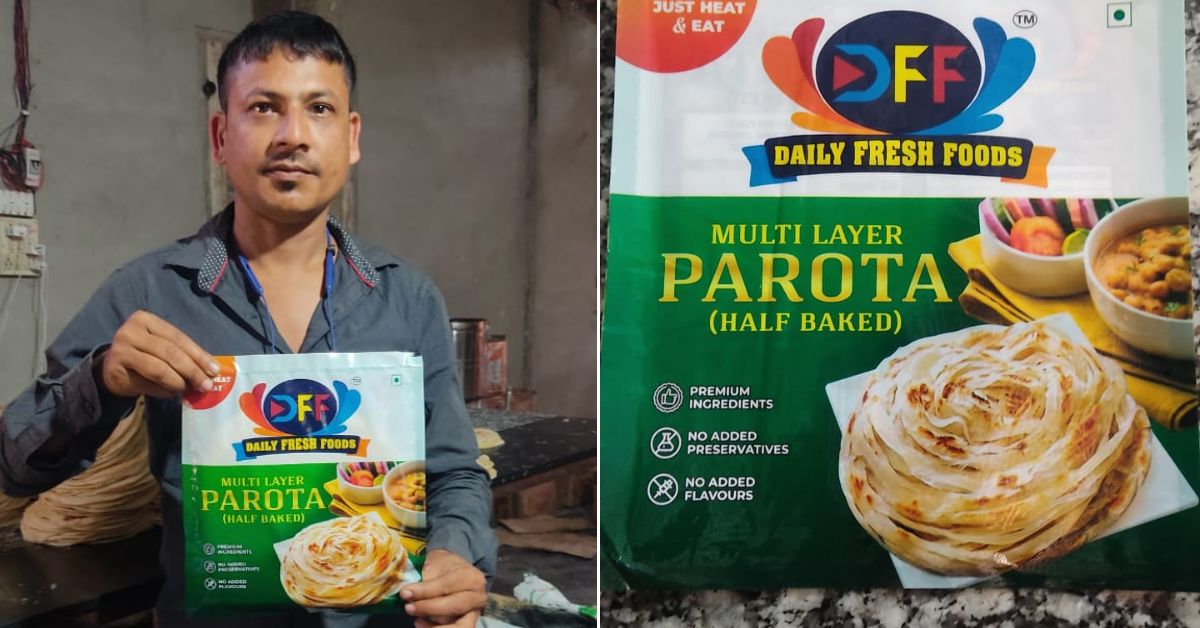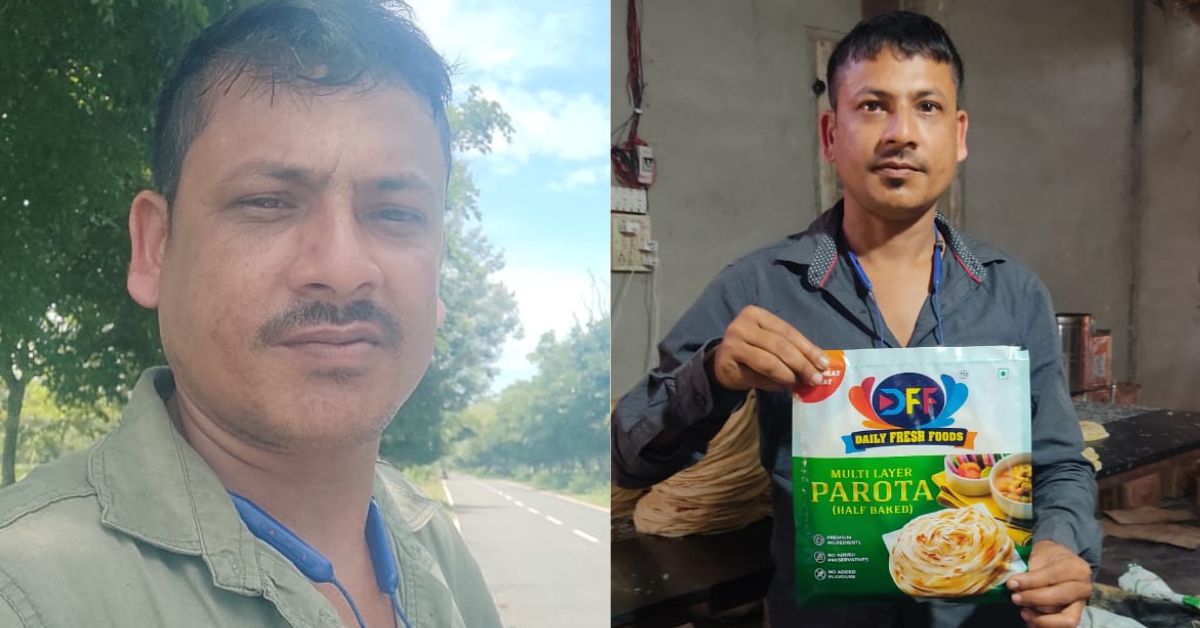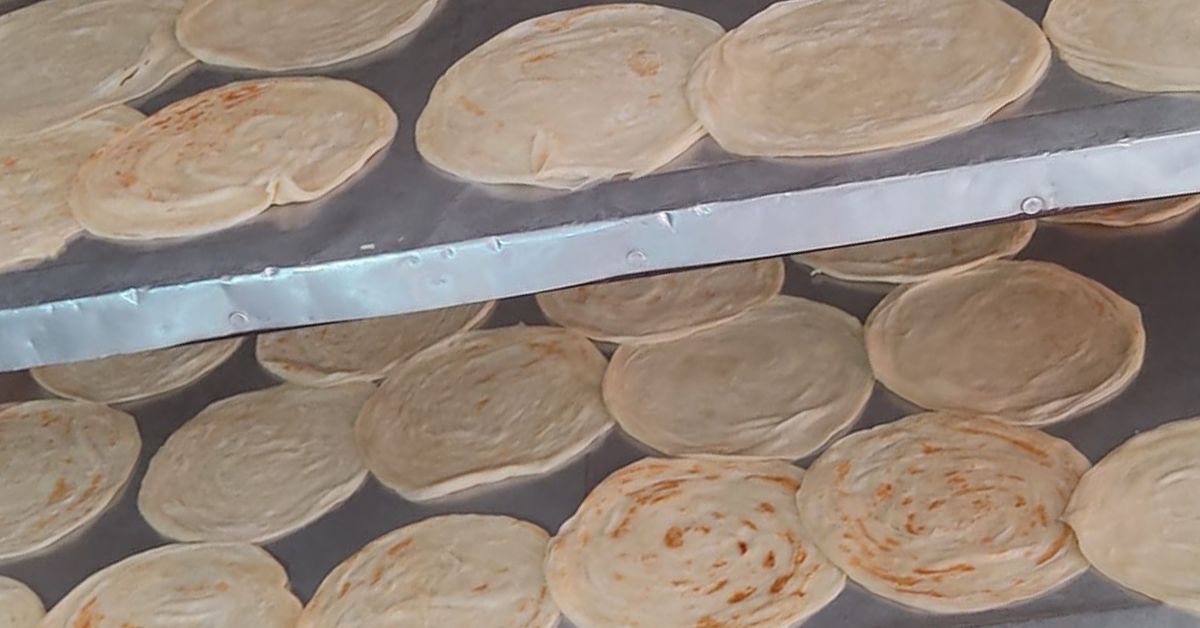Daily Wager, Security Guard & Now a Startup Founder: Assam Man Scripts Success With Parathas
A security guard in Bengaluru, Assam's Diganta Das returned to his village and launched his own startup to sell the popular Malabar parottas.

Trigger warning: Mention of death
Every year tens of thousands of young people from Assam leave the comforts of their homes in pursuit of brighter livelihood prospects in other states. The exodus is linked to a series of challenges as highlighted in a 2020 research paper — ranging from increasing rural-urban disparities and fragmentation of land holdings to a lack of alternative job opportunities. Furthermore, recurrent floods, leading to crop failures, significantly contribute to this migration pattern, emphasising the need for sustainable solutions.
One among this migratory crowd was Diganta Das. Growing up in a humble village in Sonitpur district, he witnessed his father who was a farmer toil tirelessly in the paddy fields, yet the family struggled to secure even two square meals per day.
With aspirations to break free from severe poverty, young Diganta left his home in 2001 to seek better opportunities and earn more. For 20 years, he assumed various roles, from being a labourer and cook to a security guard and coal mine worker.

However, at present, the 34-year-old proudly owns his own enterprise, Daily Fresh Food (DFF) — a food venture that offers ready-to-eat parathas (flatbread). Launched just last September, his business quickly gained traction, with him now selling a minimum of 1,500 paratha packets every day.
From doing multiple menial jobs to starting own food business
After completing his Class 10 in 2001, he started working as a construction labourer for the Border Roads Organisation at the Arunachal Pradesh border, which earned him Rs 1,200 a month.
Discontented with the job, he quit in a year and moved to Meghalaya to work in a coal mine. “Working in coal mines was really very tough,” he tells The Better India. “The blasting operations often induce ground vibration inside the mine. Strong vibrations damage the structure and result in ceiling collapse. We frequently witnessed mishaps.”
He continues, “I remember it was the day of Maghi Purnima (auspicious full moon day) when one of my friends from the village was inside the coal mine. Due to the strong vibrations, a ceiling collapsed and he got trapped inside. We later found him dead; his body was crushed,” shares Diganta.
Diganta Das, a manual labour of Pkg food industry of South India, returned home during Covid & dared to open small packaged Parota making units in Biswanath Chariali & Lakhimpur, churning out avg 1200 packets daily at each centre capturing market from Tezpur to Tinsukia. 1/3 pic.twitter.com/mBzcV5sdEV— Mrinal Talukdar (@mrinaltalukdar8) March 27, 2023
This incident left him devastated and he decided to pack his bag and go home.
Soon after, he left for Sikkim where he started working again as a construction worker. After two more years, he decided to move to Bengaluru. “Most of the youth from our state go to cities like Delhi, Bengaluru, and Pune for work. I had always wanted to see Bengaluru, so I moved there,” he says.
He secured the work of a security guard in the city for a monthly salary of Rs 4,500, but amid low salary and untimely payments, he eventually quit that work too. “I did not have a problem in working hard, but I wished to earn a decent income for all the hard work,” he says.
Later on, Diganta worked as a cook in Guwahati until he secured a job as a mixing man in a food manufacturing unit in Mangaluru. The exposure helped him understand the nitty-gritty of the food production industry. And soon, he was offered the job of a paratha maker.
Just when he thought things were improving, he met with an accident. In 2017, he was left paralysed after a high-voltage electric cable fell on him. “I had to return to my village. That was the toughest phase of my life as I was without work for so many months,” says Diganta adding that it took almost two years for him to completely recover.

Then, one of his friends who had also ventured into the paratha-making business, approached Diganta, given his experience in the field. He asked for help in establishing a manufacturing unit in Assam. Finally, Diganta had his calling.
Introducing Kerala delight in Assam
In 2022, Diganta started a packaged paratha business DFF (Daily Fresh Food) in Assam. While his friend helped him with the machinery, Diganta exhausted his entire life savings of Rs 7 lakh to establish the business. Within a year, the parathas gained immense popularity.
What sets their parathas — a delicacy in Kerala and Tamil Nadu — apart is their ability to provide an authentic Malabar culinary experience, characterised by their crispy, flaky, soft, and multi-layered texture. Their ready-to-eat parathas save people from the effort of dough kneading and rolling.
But introducing this South Indian culinary delight in the Northeastern state was not easy. “Initially, I went door to door of various restaurants with samples and requested people to try our parathas. At first, they would be reluctant. But then I would make the paratha within a few minutes and serve it to them with curry. Whoever tasted it appreciated the quality and the taste of my parathas. Soon, many more people started adding this dish to their menus,” he says.
Priced at Rs 60 and Rs 100, these packaged parathas come in packs of five or 10 pieces. They have a shelf life of three days, which extends up to seven days if stored in refrigerators. It has become a good choice for working professionals.
Assam-based Akhilesh Gupta, who runs a tea stall, loves these parathas. He tells The Better India, “Although this was a new kind of paratha, we absolutely loved it. It has so many layers and is so soft to eat. We keep a stock of it, and whenever we run out of wheat at home, these parathas come to our rescue.”
For Diganta, this experience helped him battle poverty and build the life he desired for his family. “I was not qualified enough to get a high-salaried job. I was always reluctant to do farming, so I always ran from city to city doing menial jobs. I am glad that I was able to climb the ladder of success right from the place where it all started — my village,” he says. If you found our stories insightful, informative, or even just enjoyable, we invite you to consider making a voluntary payment to support the work we do at The Better India. Your contribution helps us continue producing quality content that educates, inspires, and drives positive change. Choose one of the payment options below for your contribution- By paying for the stories you value, you directly contribute to sustaining our efforts focused on making a difference in the world. Together, let’s ensure that impactful stories continue to be told and shared, enriching lives and communities alike. Thank you for your support. Here are some frequently asked questions you might find helpful to know why you are contributing?

(Edited by Pranita Bhat; All photos: Diganta Das)
Source:
Factors and Impact of Rural Out-Migration in Assam: Published by Blue Eyes Intelligence Engineering & Sciences Publication in 2020.
This story made me
- 97
- 121
- 89
- 167











